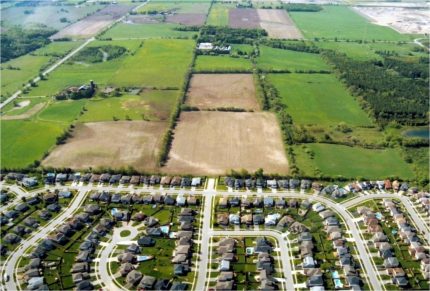Ontario Farmland Trust on Municipal Zoning Orders
Posted: February 17, 2021
Categories: GoodFoodBites
We’d like to encourage you all to read this piece from Ontario Farmland Trust on Municipal Zoning Orders (MZOs). The content below has been copied from their blog:

Ontario Farmland Trust image
“In most areas in Ontario, the responsibility for land-use planning is shared between the province and the municipalities. The province uses provincial plans such as the Planning Act and the Provincial Policy Statement to lay the groundwork for land-use planning in Ontario1. These plans also help to protect the province’s farmland and ensure the viability of Ontario’s agricultural industry.
Municipalities then must implement land-use plans that match up with these provincial plans1. In most highly populated areas of Ontario, there is an upper tier municipality (like a county or a region) who creates an official regional land-use plan that conforms to the provincial plans. Then, a lower tier municipality (like a township) must create a land-use plan that aligns with the upper tier’s plan. On another note, cities (like Toronto or Barrie) have their own official plans, separate from the surrounding municipalities, that must still conform to the provincial plans.
So, between the provincial policies and the regional and local municipal plans, land-use planning in Ontario’s established communities is comprehensive, and has had significant provincial input. It is also tailored to the needs of the region and is planned many years in advance to direct the growth in the communities to specific areas.
Then there are Municipal Zoning Orders, or MZOs.
MZOs are a very powerful planning tool that essentially allows the Minister of Municipal Affairs and Housing to change land-use designations for pieces of land at will. MZOs were initially introduced into provincial legislature to allow for the Minister to make decisions over land that had no official plan, and in specific extenuating circumstances in which there was a provincial issue in question2. However, MZOs are increasingly being used to fast-track development in municipalities that have comprehensive land-use planning already in place.
In fact, in this most recent term of government, there have been more MZOs passed than there were in the previous 10 years of government3.
MZOs are still described by the Ministry of Municipal Affairs and Housing as rarely used in municipalities that have existing zoning by-laws2, however most of the MZOs that have been passed are located in municipalities that already have comprehensive land-use planning. Many of these MZOs are being used to expedite residential development on farmland and natural habitat.
Now, under the recent changes contained in Bill 197, the Minister has even more power to approve MZOs.
OFT believes that the enhanced powers of the Minister to issue MZOs that were given in Bill 197 are unnecessary, and that these powers should be repealed. The increasing use of MZOs for purposes outside of their traditional role puts farmland in Ontario at risk. Enhancing the powers of the Minister to issue MZOs only promotes their use in areas where effective land-use planning practices are already in place.
OFT recently submitted comments on the proposed implementation of the provisions in the Planning Act that provide the Minister enhanced authority to address certain matters as part of a zoning order (Bill 197).
To read our full submission, click here. To read our other policy reviews, visit our Farmland Policy page.
1. Ontario Ministry of Municipal Affairs and Housing. 2020. Citizen’s Guide to Land Use Planning. https://www.ontario.ca/document/citizens-guide-land-use-planning/planning-act
2. Ontario Ministry of Municipal Affairs and Housing. 2020. Citizen’s Guide to Land Use Planning. https://www.ontario.ca/document/citizens-guide-land-use-planning/zoning-bylaws#section-11
3. Federation of Urban Neighbourhoods. 2020. Minister’s Zoning Orders. https://urbanneighbourhoods.ca/ministers-zoning-orders/
“
